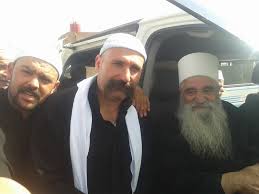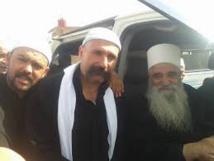"Six members of regime security forces were shot dead on Friday night," Observatory chief Rami Abdel Rahman said.
The deaths came when angry local residents, some of them armed, attacked two security branches in Sweida after news of Balous's assassination.
The cleric was a popular figure among Syria's Druze minority which made up around three percent of the country's pre-war population of 23 million.
The Druze, who follow a secretive offshoot of Shiite Islam, have been divided during Syria's civil war, with some members fighting on the government side and others expressing sympathy for the opposition.
Balous led the "Sheikhs of Dignity" group, Sweida's most powerful militia, and fought the Islamic State group and Al-Qaeda affiliate Al-Nusra Front.
But he also opposed conscription of Druze men in a province where thousands of the sect's members have evaded service in the Syrian army's dwindling ranks, refusing to take up arms outside their own areas.
As word of Balous's death spread on Friday night, protesters pelted the municipality building with stones, and gunfire was heard outside two security headquarters in the city.
Residents said demonstrators also smashed a statue in the city centre of Hafez al-Assad, father and predecessor of President Bashar al-Assad.
Local Druze clerics later intervened with the protesters to urge them to return home.
On Saturday, calm returned to the city although residents said Internet connections remained down and an army checkpoint blocked the main road to Damascus.
In the capital, a security source insisted the demonstrations were against "terrorism" not the regime.
State media reported the car bombs but made no mention of Balous's death.
Sweida has largely been spared the violence that the rest of Syria has experienced since the conflict erupted in March 2011.
But there has been occasional unrest, including protests backed by Balous just days before his death, in which residents demanded better government services, including power and water.
Analysts said Balous's killing appeared intended to intimidate parts of the Druze community that have sought to hedge their bets and distance themselves from a weakened regime.
"Balous symbolised that movement of Druze wanting to be independent from the regime, but also not hostile to the opposition, wanting to decide their own fate," said Hassan Hassan, an associate fellow at the Chatham House think tank.
"The regime had made it clear that this movement was not to be tolerated."
Thomas Pierret, a Syria expert at the University of Edinburgh, said the short-term anger was a price the regime was willing to pay to undermine Balous's movement.
"It managed to eliminate the most influential critical voice among the Druze community," he said.
--------------------------------------------------------------------------------------------------------------------
The deaths came when angry local residents, some of them armed, attacked two security branches in Sweida after news of Balous's assassination.
The cleric was a popular figure among Syria's Druze minority which made up around three percent of the country's pre-war population of 23 million.
The Druze, who follow a secretive offshoot of Shiite Islam, have been divided during Syria's civil war, with some members fighting on the government side and others expressing sympathy for the opposition.
Balous led the "Sheikhs of Dignity" group, Sweida's most powerful militia, and fought the Islamic State group and Al-Qaeda affiliate Al-Nusra Front.
But he also opposed conscription of Druze men in a province where thousands of the sect's members have evaded service in the Syrian army's dwindling ranks, refusing to take up arms outside their own areas.
As word of Balous's death spread on Friday night, protesters pelted the municipality building with stones, and gunfire was heard outside two security headquarters in the city.
Residents said demonstrators also smashed a statue in the city centre of Hafez al-Assad, father and predecessor of President Bashar al-Assad.
Local Druze clerics later intervened with the protesters to urge them to return home.
On Saturday, calm returned to the city although residents said Internet connections remained down and an army checkpoint blocked the main road to Damascus.
In the capital, a security source insisted the demonstrations were against "terrorism" not the regime.
State media reported the car bombs but made no mention of Balous's death.
Sweida has largely been spared the violence that the rest of Syria has experienced since the conflict erupted in March 2011.
But there has been occasional unrest, including protests backed by Balous just days before his death, in which residents demanded better government services, including power and water.
Analysts said Balous's killing appeared intended to intimidate parts of the Druze community that have sought to hedge their bets and distance themselves from a weakened regime.
"Balous symbolised that movement of Druze wanting to be independent from the regime, but also not hostile to the opposition, wanting to decide their own fate," said Hassan Hassan, an associate fellow at the Chatham House think tank.
"The regime had made it clear that this movement was not to be tolerated."
Thomas Pierret, a Syria expert at the University of Edinburgh, said the short-term anger was a price the regime was willing to pay to undermine Balous's movement.
"It managed to eliminate the most influential critical voice among the Druze community," he said.
--------------------------------------------------------------------------------------------------------------------









 Home
Home Politics
Politics











